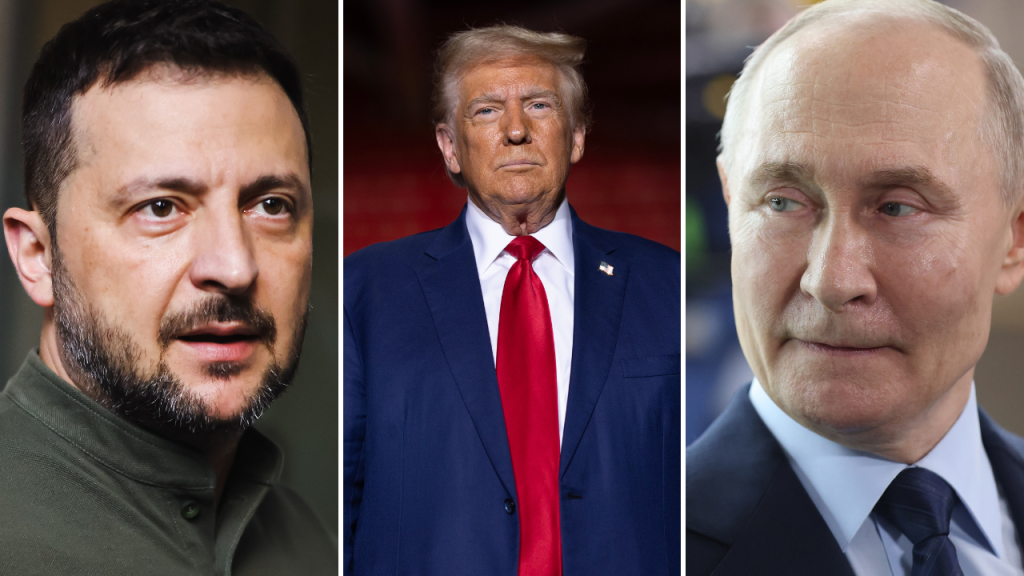The Perils of Exclusion: Zelenskyy’s Concerns and the Implications for Global Security
Ukrainian President Volodymyr Zelenskyy has voiced profound concerns about the potential exclusion of Ukraine from U.S.-led negotiations regarding the withdrawal of Russian troops from Ukraine’s eastern territories. He argues that such an exclusion would establish a dangerous precedent, effectively emboldening dictators worldwide by demonstrating that aggression can be rewarded with impunity and concessions. Zelenskyy’s apprehension stems from the belief that sidelining Ukraine in these crucial discussions would legitimize Russia’s invasion and signal to other authoritarian leaders that similar actions might be tolerated by the international community. This, he fears, could destabilize global security and encourage further acts of aggression by emboldened autocrats.
Zelenskyy’s warning underscores the vital importance of Ukraine’s participation in any negotiations concerning its own future and territorial integrity. Excluding Ukraine would not only undermine its sovereignty but also disregard the fundamental principle of self-determination. It is imperative that Ukraine’s voice be heard and its interests be represented in any discussions aimed at resolving the conflict. A negotiated settlement achieved without Ukraine’s involvement would likely be unsustainable and could sow the seeds of future conflict.
Discrepancies in Aid and the Unfolding Negotiations: A Complex Landscape
Amidst the ongoing diplomatic efforts, discrepancies have emerged regarding the amount of military aid provided to Ukraine by the United States. While the U.S. has pledged over $175 billion in military assistance, Zelenskyy contends that Ukraine has only received approximately $75 billion. This significant discrepancy raises questions about the allocation and disbursement of the remaining funds. Clarification on this matter is crucial for transparency and accountability and to ensure that the promised support reaches Ukraine effectively.
Former President Trump’s involvement in the negotiations has added another layer of complexity to the situation. He has claimed that his administration initiated talks with Moscow and that these discussions are progressing favorably. However, details about these talks remain scarce, including the specific individuals involved and the nature of the discussions. This lack of transparency fuels uncertainty and raises concerns about the direction and potential outcomes of the negotiations.
Trump’s Approach and the Challenges of Negotiation: Navigating Competing Interests
Trump’s special envoy for Ukraine and Russia, retired Army Lt. Gen. Keith Kellogg, has expressed confidence in Trump’s ability to navigate the complexities of the negotiations, emphasizing his understanding of leverage and pressure points. However, the specific mechanisms by which Trump intends to exert pressure on both Moscow and Kyiv remain unclear, particularly given the entrenched positions of both sides on critical issues such as Ukraine’s NATO membership.
Zelenskyy has suggested that Trump could leverage increased sanctions on Russia’s energy and banking sectors, coupled with continued military aid to Ukraine, to incentivize Putin’s engagement in meaningful negotiations. However, the effectiveness of such measures remains to be seen, as Russia has demonstrated resilience to previous sanctions and may be unwilling to compromise on its core objectives.
NATO Membership and the Nuclear Threat: A Delicate Balancing Act
Zelenskyy has advocated for Ukraine’s admission into NATO, arguing that it would provide the most cost-effective security guarantee for Ukraine and its allies. NATO membership would extend Article Five protection to Ukraine, deterring further Russian aggression. However, Putin has repeatedly threatened nuclear escalation if Ukraine joins the alliance, creating a high-stakes dilemma for the international community.
Balancing Ukraine’s security aspirations with the imperative of avoiding nuclear conflict requires careful diplomacy and a nuanced approach. NATO membership for Ukraine would undoubtedly enhance its security but could also escalate tensions with Russia, potentially leading to disastrous consequences. Finding a solution that addresses Ukraine’s security concerns without provoking a nuclear confrontation is a paramount challenge for global diplomacy.
The Path Forward: Balancing Interests and Ensuring a Lasting Peace
The ongoing negotiations surrounding the withdrawal of Russian troops from Ukraine represent a pivotal moment for international security. Finding a resolution that respects Ukraine’s sovereignty, addresses Russia’s security concerns, and prevents further escalation is a complex undertaking. Transparency, inclusivity, and a commitment to international law are crucial for achieving a just and lasting peace. Excluding Ukraine from the negotiating table would be a grave mistake, undermining the very principles of self-determination and territorial integrity that underpin a stable and secure global order.
The international community must work collaboratively to ensure that any negotiated settlement is inclusive, respects international law, and addresses the root causes of the conflict. A comprehensive approach that includes security guarantees for Ukraine, mechanisms for conflict resolution, and addressing underlying grievances is essential for achieving a sustainable peace. Failure to do so risks prolonging the conflict, further destabilizing the region, and setting a dangerous precedent for future conflicts.


